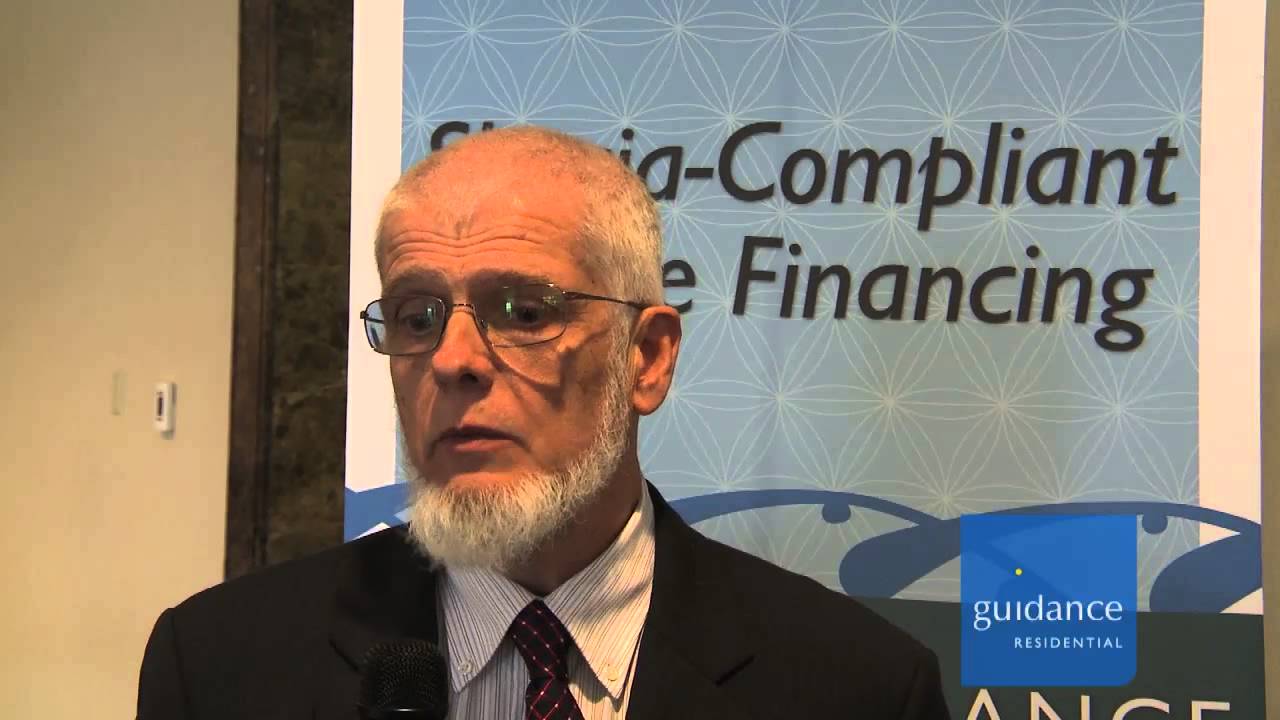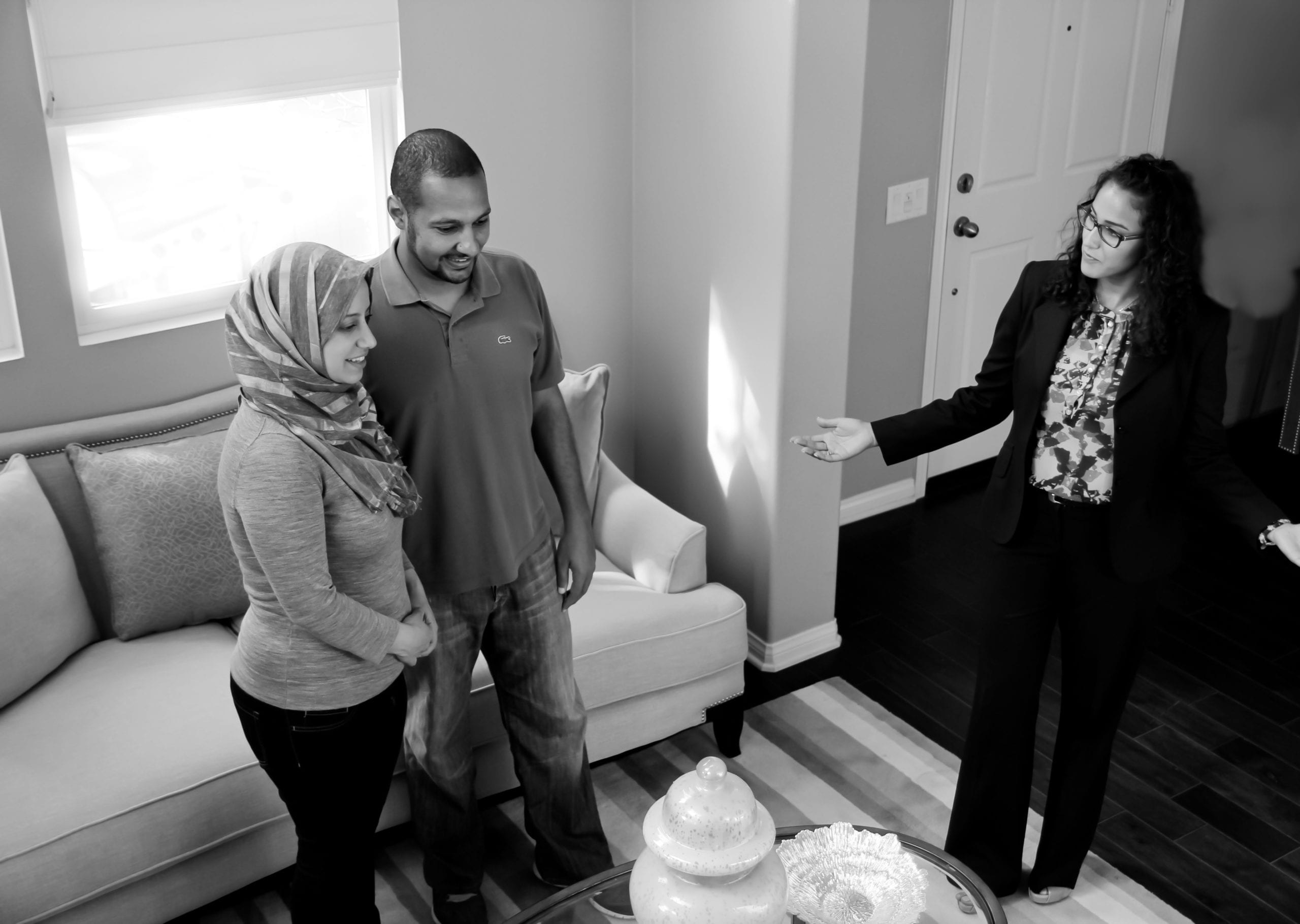10 Common Questions about Buying a House the Halal Way

Adam and Sarah want to buy a house. They do their best to follow their faith in day to day life, and they know Islam forbids them from giving or receiving interest, known to Muslims as riba or usury. They know a conventional mortgage is based on interest, but they don’t see another option. And they don’t want to rent anymore — they want stability, and they want to invest in their future.
Then Adam spoke with a friend who mentioned Islamic Home Financing. The couple realized that as American Muslims, it IS possible to buy a house in a strictly halal way without violating the laws of their faith. Islamic mortgages now enable families to stop renting and put down strong roots in their communities.
There are many American Muslim families who have similar questions about Islamic mortgage alternatives. Below are the 10 most commonly asked questions about Islamic Home Financing from potential home buyers.
The Top 10 Questions about Halal Mortgages — Answered
1. What is Shariah-Compliant Home Financing?
Shariah-compliant home financing is a way to buy a house that follows Islamic financial rules. To protect individuals and the community they live in, the following are prohibited: riba (usury/interest), gharar (speculation or contractual uncertainty), and maysir (gambling). This means traditional mortgages are not an acceptable option to Muslims who want to buy a house.
>> Learn more about Islamic finance
With conventional loans, the borrower must pay interest (riba); however, charging and paying interest is prohibited according to Islam as well as some other religious beliefs. Guidance Residential’s Shariah-compliant home financing program does not involve riba. The Declining Balance Co-ownership model used in Guidance Residential’s halal mortgages is based on an equity partnership between Guidance and the customer.
Guidance Residential’s program is a more socially responsible approach to financial transactions and ethical investing than a conventional mortgage. Here are six reasons why:
Co-ownership
Rather than a borrower-lender arrangement, Guidance Residential and the customer buy the property as co-owners. The customer is not a debtor and does not borrow money; rather, they are a valued partner. This co-ownership relationship is inherently more equitable from the foundation up.
Related reading: Guidance Residential Senior Vice President Hussam Qutub was interviewed by Marketplace — a division of Minnesota Public Radio — about the impact of homeownership and how the co-ownership model works. Read how Islamic finance opens new doors for Muslim homeowners.
Risk sharing
In a traditional mortgage, one party — the customer — bears nearly all of the risk. In a co-ownership arrangement, on the other hand, Guidance Residential shares the risk with the home buyer in certain instances of loss. These instances can include natural disasters, condemnation or eminent domain.
That’s because the home purchase is essentially a joint investment in which risks and profits are shared according to common-sense guidelines. It should be noted that if the home is sold for a profit, however, that profit belongs solely to the homeowner. It’s a win-win for the customer.
Riba-free
The Declining Balance Co-ownership Program, does not involve a debtor paying interest to a creditor – it is 100% riba-free.
In Islam, a loan is intended to be a form of charity in which one person helps another. The lender should expect repayment only of the amount paid — no profit or interest.
In Islamic finance, a company is allowed to profit in different ways such as via profit sharing, and the customer pays Guidance a fee for using the company’s share of the home they purchased together. It is acceptable for that fee to be competitive and comparable with a traditional home mortgage for the sake of simplicity. But the fees paid by Guidance’s customers are entirely different from riba.
No prepayment penalty
In a conventional mortgage, if the homeowner decides to pay off the home early, the bank loses out on interest that would have been paid, so it has historically been customary for the bank to charge what is called a prepayment penalty to offset that loss.
Guidance Residential, on the other hand, does not charge any fee if you decide to pay ahead of schedule.
Capped late payment fees
In a conventional mortgage, when a payment is late, the bank immediately charges late fees that often equal about 5% of the payment owed. On a $2,500 mortgage payment, that could mean paying an extra $125 each month you are late — presumably when you are already facing hardship. Only a portion of that late fee goes to the administrative expenses of reaching out to you for the payment; the rest is profit.
With Guidance Residential, if you make a payment late, we charge only a flat fee equaling $50 or less, exclusively meant to cover the expenses involved in administering a late payment. We do not profit from your hardship.
Default and foreclosure
If a homeowner is unable to continue paying for their home and begins to default on their monthly payments, foreclosure may be inevitable and the home will be sold in an attempt to recover the cost. In the case of a conventional mortgage, if the home sale doesn’t cover the amount you owe the bank, in many states the bank or lender will go to court in an attempt to seize your personal assets to pay the difference. Not only does the customer lose the home, they could also lose the contents of a bank account or their car.
At Guidance Residential, we don’t do that. If the proceeds from the home’s sale do not cover our portion of the property, we do not pursue our customers’ personal assets. The only asset that can be taken back in the case of foreclosure according to shariah principles is the one that was purchased. The buyer is safe from having anything else taken to repay the loss.
2. How does the Declining Balance Co-Ownership Program Work?
In order to be an acceptable method for commerce according to Islam, a home financing program must be modeled after one of several permissible Islamic financing concepts. The most suitable of these for home financing in America is known as “Musharakah Mutanaqisa” or “Diminishing Partnership,” so that’s the approach Guidance Residential chose.
In this model, Guidance and the homeowner buy the home together, with each party owning a percentage of it in proportion to the equity they contribute. Home buyers are required to make a monthly payment to Guidance Residential over a predetermined period of time in order to completely buy out Guidance Residential’s shares in the property and become the sole owner.
The monthly payment consists of two portions:
- An amount for the acquisition of a portion of Guidance Residential’s ownership interest (Acquisition Payment). The Acquisition Payment serves to purchase Guidance Residential’s shares of ownership over the predetermined period of time.
- An amount for the exclusive use of the entire property (Profit Payment). The Profit Payment serves to allow the home buyer to use the part of the property owned by Guidance.
For example: If a client wishes to purchase a $300,000 home and has $30,000 for a down payment, Guidance will contribute the remaining $270,000 in funds to purchase the home together forming a co-ownership arrangement. The co-ownership agreement is set up on a 15-, 20-, or 30-year contract in which monthly payments are made to Guidance Residential. In accordance with the terms of the co-ownership agreement, the home buyer can sell the property at any time, and any profit from that sale will belong to them alone.
3. What is the role of Freddie Mac in the program?
Scholars of Islamic financial law and shariah compliant investment have confirmed that it is permissible for Guidance to introduce other investors to take a co-ownership stake in a given property. In doing so, we are able to meet our customers’ needs to their satisfaction and ensure that investors will always be bound by their rights and obligations as co-owners in the property.
Freddie Mac falls under this category of additional investors that allow us to better serve our customers. Freddie Mac is a federally mandated institution chartered by Congress in 1970, to provide funds for home financing companies in order to promote and advance the American dream of home ownership.
For properties financed by Guidance Residential’s Co-ownership Program, Guidance sells its co-ownership stake to Freddie Mac, who then becomes an investor. Guidance continues to be the party to administer the agreement with the customer in accordance with Islamic financial principles. This collaborative effort, with all terms agreed upon in the co-ownership agreement remaining unchanged throughout the duration of the contract, is approved by the Guidance’s independent shariah board.
Guidance Residential worked with Freddie Mac and 18 law firms for three years to create a unique legal structure that does not involve the sale of debt and is compliant with shariah law. Guidance is the only organization in the U.S. allowed to deliver the Declining Balance Co-ownership structure to Freddie Mac.
4. How is the Declining Co-Ownership Program different from conventional mortgage loans?
The entire foundation of Guidance’s home financing is different from that of a conventional mortgage loan. The relationship between Guidance Residential and the home buyer is that of co-owners in a property and not that of a borrower-lender. The initial financing provided by Guidance Residential in these real estate transactions is applied to acquire a share of the property and not to provide a loan.
5. What makes Guidance’s program halal?
First, it is important to note that Guidance Residential is not a bank and does not take part in the haram, or prohibited, business dealings of banks, which earn their money from interest, investments, mutual funds and other financial products that do not align with sharia compliant investing principles. Observant Muslims want a financier that chooses to comply with Islamic principles in earning the income the company uses for their home.
Here are some more differences between Guidance’s model and a traditional mortgage:
- Guidance’s program is free of riba. It is based on a business partnership rather than a loan.
- It is also an asset-backed transaction as required under Islamic law, rather than essentially the purchase of money for more money, as is the case with a traditional mortgage loan.
- Guidance’s model was developed with the help of Islamic scholars and based on an accepted model of financing under Islamic law.
- It is unique in that it utilizes a globally renowned board comprising seven of the leading scholars in the world of Islamic Finance to ensure that its initiatives continue to be Shariah-compliant as well as compliant with each individual state’s laws.
6. Is Islamic finance for Muslims only?
Not at all! This ethical approach to home buying appeals to people from varying backgrounds, and non-Muslim home buyers are welcome. Guidance Residential welcomes home buyers from any community and faith to take advantage of this ethical and socially responsible approach to home ownership. This approach not only fulfils the obligation of all monotheistic faiths, but also benefits the economy with a socially responsible form of financial transaction based on real assets. Read about who can finance with Guidance.
7. Can a home be purchased with less than 20% down payment?
Yes. Customers can make a down payment as little as 5% for primary homes and 15% for investment properties, plus closing costs. In fact, the notion that a halal mortgage is more expensive than a conventional mortgage is a myth. Use this Islamic home financing calculator to review estimated payment outcomes.
8. Have you renamed “interest” as “halal financing”?
No. Interest is charged on a loan, whereas profit is charged for a tangible good or service. At Guidance Residential the contract is not a loan contract, but an equity partnership contract related to a tangible asset – the home.
While we have structured our program externally to look similar to the home buying process involving a mortgage for the sake of simplicity for our customers and regulators, the entire foundation is different from a loan. As a comparison, two bags of potato chips might look the same on the outside and cost the same, while one is made with lard and the other is cooked in vegetable oil. One is halal while the other is not.
Looking for more information? Read more about whether Islamic mortgages are really halal.
9. Why do Islamic financial institutions need credit scores?
Anyone looking to buy a home must meet specific requirements to demonstrate that they can uphold their end of the deal.
In the early days of Islam, investors would inquire about a potential partner’s history of doing business before entering in a contract in order to determine whether the partner was able to fulfill the trust (amanah) of the financial transaction. (In modern jargon, financial industry calls it “credit worthiness.”)
In current business practice, a credit score and the customer’s credit history serves as a standardized method of determining that worthiness.
10. Is Islamic financing more expensive than conventional mortgages?
Not anymore. Guidance Residential’s objective is not just to offer Shariah-compliant home financing, but also to provide Muslim mortgages at a competitive price (a top-notch customer experience). Not to mention the other benefits that save you money compared to a conventional loan.
Learn more about Islamic home financing:
Start Your Home Buying Journey
Buying a home is one of the most important decisions you will make. The team at Guidance Residential is here for you every step of the way from pre-qualification and pre-approval on through to finding the right real estate agent for you and your family. We invite you to explore the home buying process with Guidance Residential today.
Guidance Residential’s co-ownership model of Islamic home financing remains the #1 U.S. Islamic home financing provider, with more than 40,000 families assisted over more than 20 years. Learn more and get started on your home finance journey today.
Your Guidance Residential Account Executive is here to help with any questions. Looking to refinance or purchase? Have a friend or family member who is looking for a home? Call 1.866.Guidance, or start an application today.
Originally posted in June 2016, updated July 2024.




